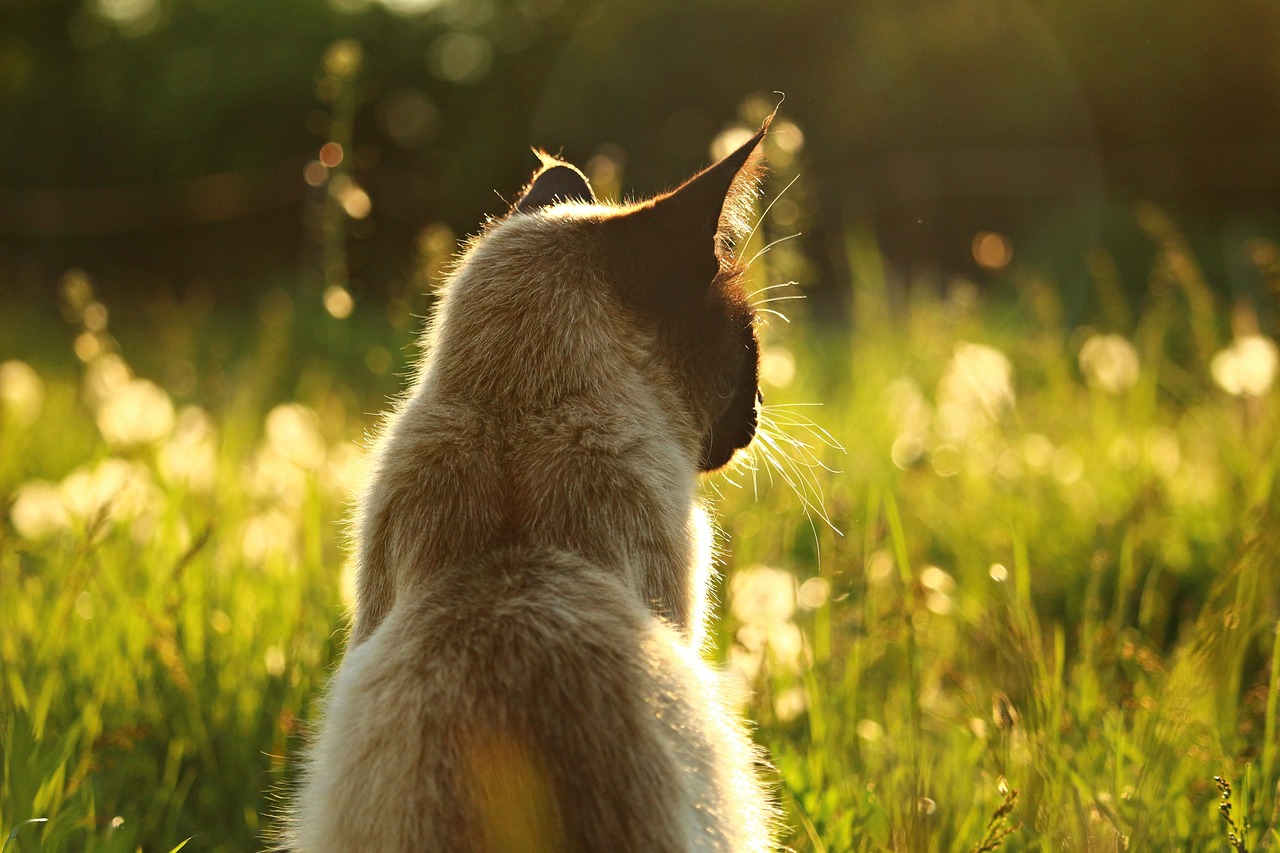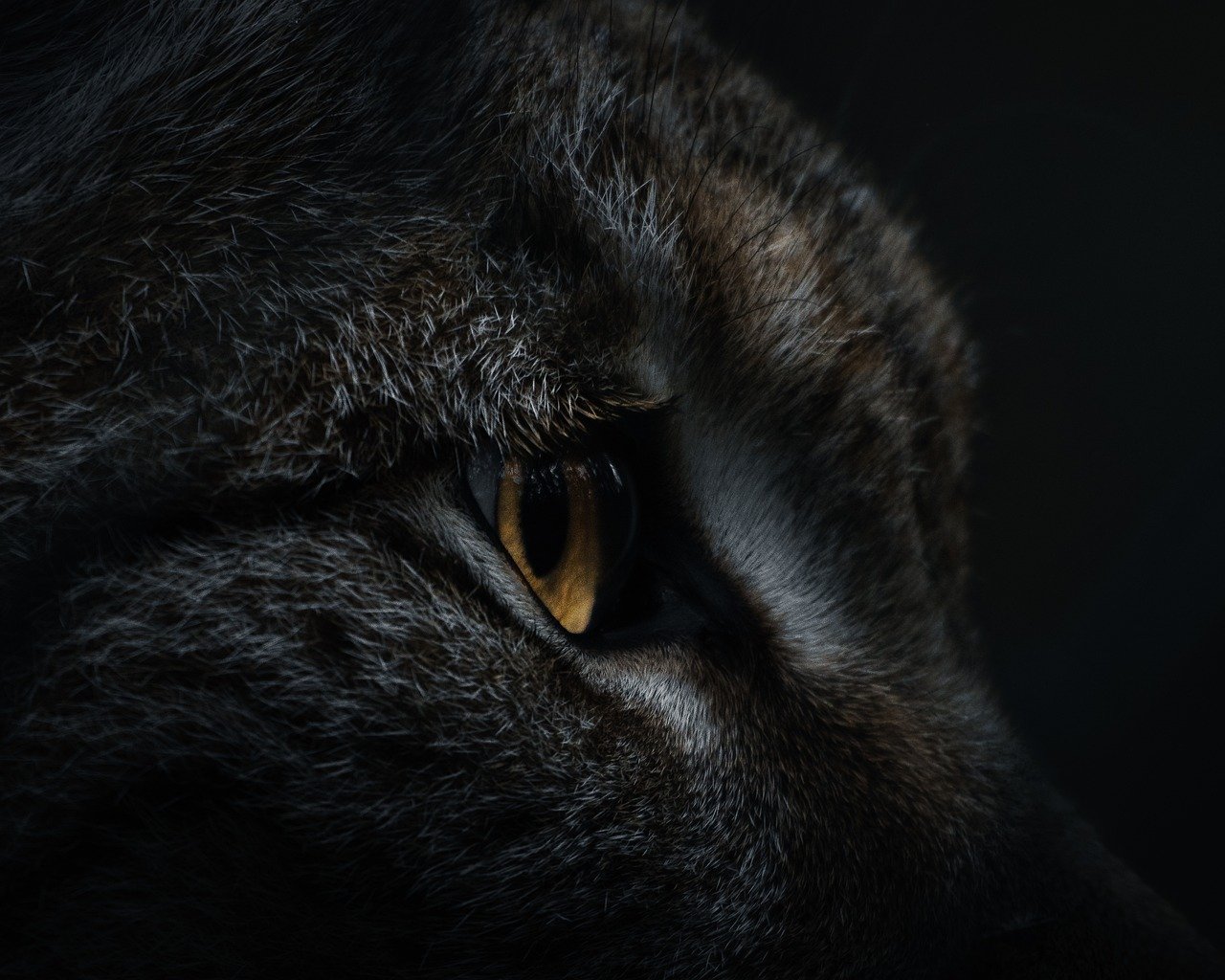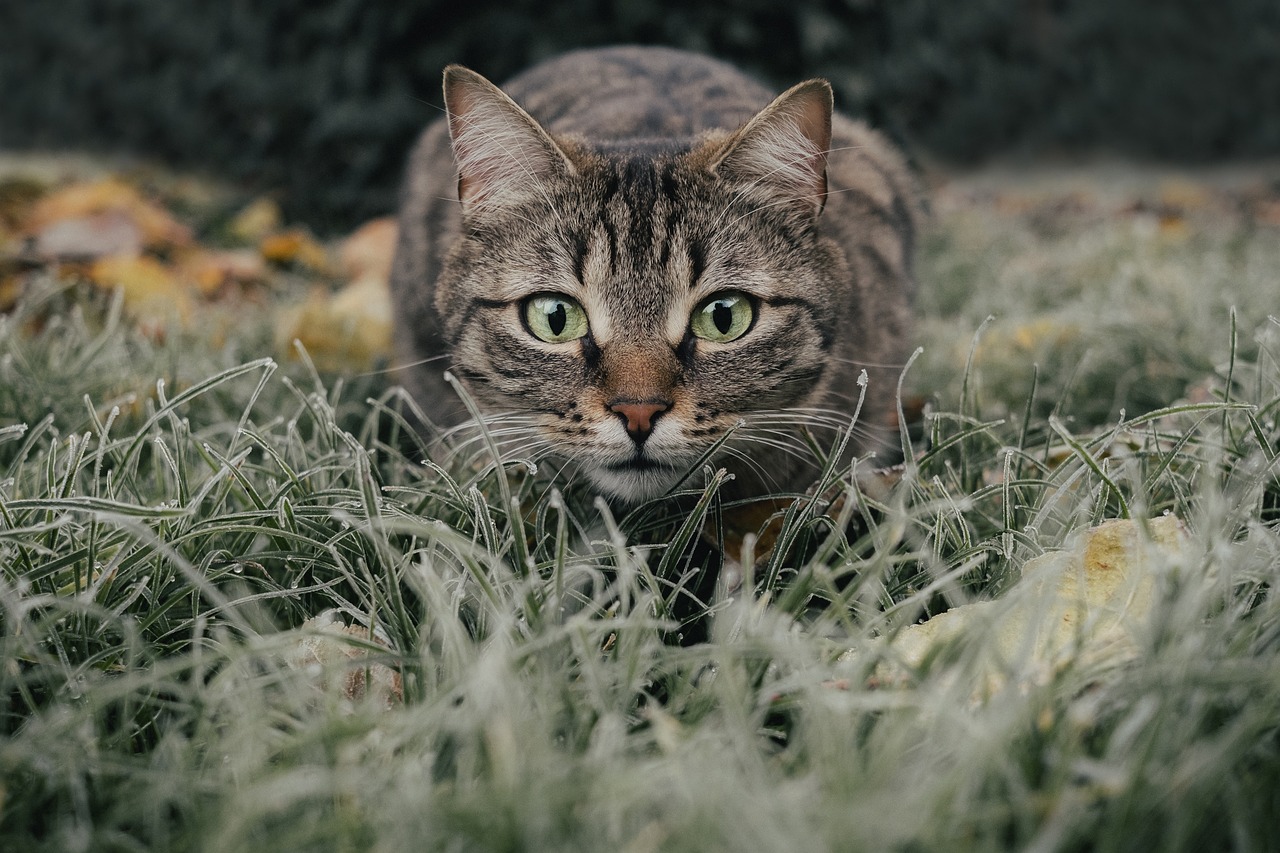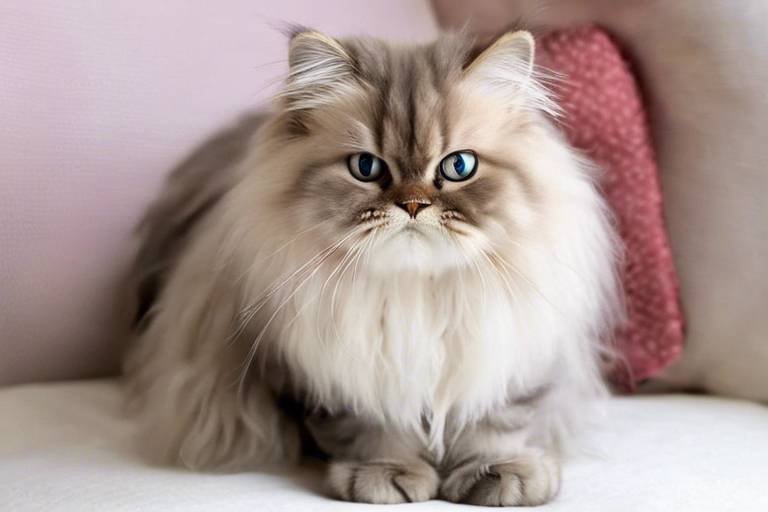The Unique Features of the Siamese
The Siamese cat is not just a pet; it’s a vibrant personality wrapped in a sleek, elegant body. Known for their striking appearance and captivating behaviors, Siamese cats have earned a special place in the hearts of cat lovers worldwide. With their unique color points, piercing blue eyes, and a penchant for vocalization, these felines are anything but ordinary. In this article, we will explore the distinctive characteristics that make the Siamese breed so beloved, from their physical traits to their social behaviors and health considerations.
Siamese cats are renowned for their striking looks, featuring a sleek, muscular body and unique color points. The breed typically showcases a short, fine coat that comes in a variety of colors, including seal, chocolate, blue, and lilac. What truly sets them apart are their distinctive color points, which are darker shades found on their ears, face, paws, and tail, contrasting beautifully with their lighter body color. Their almond-shaped, bright blue eyes are another hallmark of the breed, often described as captivating and expressive. This combination of features not only makes them visually stunning but also gives them an air of elegance and grace that is hard to resist.
One of the most fascinating aspects of Siamese cats is their vocal nature. Known for their chatty demeanor, these felines have a wide range of vocalizations that can include everything from soft chirps to loud yowls. Each sound can convey different meanings, and many owners find that their Siamese uses vocalizations to communicate specific needs or emotions. For instance, a soft meow might indicate a desire for attention, while a more urgent yowl could signal hunger or distress. This remarkable ability to communicate makes Siamese cats incredibly engaging companions, as they often develop a unique language with their human family members.
Siamese cats are highly social creatures that thrive on interaction. They form strong bonds with their human companions, often following them around the house and seeking out opportunities for play and affection. Their affectionate nature means they enjoy cuddling and will often curl up on a lap or snuggle next to their owners. This breed is known for its playful spirit, which can lead to hours of entertainment for both the cat and its family. However, this social inclination also means that Siamese cats can become lonely if left alone for extended periods. Therefore, it’s essential for owners to provide ample social interaction and mental stimulation to ensure their Siamese remains happy and healthy.
Understanding how Siamese cats interact with other pets in the household is crucial for a harmonious living environment. Generally, Siamese cats are known to be friendly and can get along well with other animals, including dogs and other cats. However, their social nature means they may require gradual introductions and supervision during initial interactions. Positive reinforcement and shared playtime can help foster a peaceful relationship among pets. It’s essential to create a space where each pet feels safe and comfortable, allowing them to coexist without stress.
Another noteworthy trait of the Siamese cat is their adaptability. Whether you live in a bustling city apartment or a quiet suburban home, Siamese cats can adjust to various living environments. Their adaptable nature allows them to thrive in different settings, provided they have sufficient social interaction and mental stimulation. Changes in surroundings, such as moving to a new home, can be challenging for some pets, but Siamese cats tend to handle these transitions with grace. Their ability to adapt makes them an excellent choice for families and individuals who may relocate or alter their living situations frequently.
Like all breeds, Siamese cats have specific health concerns that potential owners should be aware of. Common health issues include respiratory problems, dental disease, and certain genetic disorders. To ensure a long, healthy life, regular veterinary check-ups are essential. Preventive care, such as vaccinations and dental cleanings, plays a crucial role in maintaining their health. Additionally, providing a balanced diet and a stimulating environment can help mitigate some health risks, allowing your Siamese to thrive.
Siamese cats have short coats that require minimal grooming, making them relatively low-maintenance in this regard. Regular brushing helps reduce shedding and keeps their coat looking sleek and shiny. Bathing is rarely necessary, but occasional baths can help if they get into something messy. It’s also essential to keep an eye on their ears and teeth, as regular cleaning can prevent potential health issues. Overall, the grooming needs of Siamese cats are straightforward, allowing owners to focus more on playtime and bonding.
A balanced diet is essential for the health of Siamese cats. These active felines require high-quality cat food that meets their nutritional needs. Look for options that are rich in protein and free from fillers. Additionally, it’s vital to monitor their weight, as Siamese cats can be prone to obesity if overfed. Consulting with a veterinarian about the best dietary options can help ensure that your Siamese maintains a healthy weight and lifestyle.
Siamese cats are known for their unique personalities, which can be described as playful, intelligent, and sometimes a bit mischievous. Their playful nature means they are always up for a game, whether it’s chasing a feather toy or playing hide and seek. This intelligence often translates into a curious disposition, as they love to explore their surroundings and learn new tricks. Their engaging behavior makes them wonderful companions, providing endless entertainment and joy to their families.
- Do Siamese cats get along with other pets? Yes, they are generally friendly and can coexist well with other animals if introduced properly.
- How much grooming do Siamese cats need? They have short coats that require minimal grooming, but regular brushing is recommended.
- Are Siamese cats vocal? Absolutely! They are known for their chatty nature and have a wide range of vocalizations.
- What are common health issues for Siamese cats? Some common concerns include respiratory problems and dental disease, so regular vet visits are essential.

Physical Characteristics
Siamese cats are truly a feast for the eyes, boasting a striking appearance that sets them apart from other breeds. Their sleek, muscular bodies are not just for show; they are built for agility and grace, making them exceptional climbers and jumpers. One of the most captivating features of the Siamese is their unique color points. This means that their ears, face, paws, and tail are darker in color compared to the rest of their body. The contrast between the deep hues of their extremities and the lighter shades of their bodies creates a stunning visual effect that many cat enthusiasts adore.
When it comes to their coat, Siamese cats have a short, fine layer that feels incredibly smooth to the touch. Unlike some long-haired breeds that require extensive grooming, Siamese cats are relatively low-maintenance in this regard. Their coat colors can vary widely, ranging from the classic seal point (dark brown) to blue, chocolate, lilac, and even red or cream. Each color point has its own charm, making every Siamese cat unique in its own right.
But it’s not just their coat that catches the eye; their striking blue almond-shaped eyes are perhaps one of their most defining features. These mesmerizing eyes can seem to hold a world of emotion, often reflecting their playful and curious nature. The intensity of their gaze can be captivating, drawing you in and making you feel a connection that is hard to describe. It’s as if they can see right into your soul!
In terms of size, Siamese cats typically weigh between 8 to 15 pounds, with males generally being larger than females. They have long, slender legs and a long tail that adds to their elegant silhouette. Their distinctive wedge-shaped head, large ears, and elongated neck further enhance their graceful appearance. You might say they are like the supermodels of the cat world, strutting their stuff with an air of confidence and poise.
To sum up, the physical characteristics of Siamese cats are not just about looks; they embody a unique blend of beauty, agility, and personality. Their striking color points, mesmerizing blue eyes, and sleek bodies make them a favorite among cat lovers. Whether you’re drawn to their aesthetic appeal or their playful nature, there’s no denying that Siamese cats are a truly unique breed that captures the hearts of many.

Vocalizations
Siamese cats are often dubbed the "talkative" members of the feline family, and for good reason! Their vocalizations are not just random meows; they are a rich tapestry of sounds that convey a wide range of emotions and needs. Imagine having a chatty roommate who never runs out of things to say—this is what life is like with a Siamese cat! From soft purrs to loud yowls, their vocal repertoire is as diverse as their personalities.
One of the most fascinating aspects of Siamese vocalizations is their ability to communicate effectively with their human companions. Unlike many other breeds, Siamese cats tend to develop a unique "language" with their owners. For instance, a long, drawn-out meow may indicate that your furry friend is feeling particularly needy or wants your attention. On the other hand, a series of short, sharp meows can express excitement, perhaps signaling that it’s time for play or feeding. It’s almost like they have their own set of codes that you can learn to decipher!
To give you a clearer picture, here’s a brief overview of some common vocalizations you might encounter with a Siamese cat:
- Chirps: These sweet, bird-like sounds often signal happiness or excitement.
- Yowls: Loud and sometimes alarming, yowls can indicate distress, mating calls, or a strong desire for attention.
- Trills: Short and sweet, trills are often used as a greeting, showing affection and happiness.
- Purring: A classic sign of contentment, purring can also occur when a cat is in pain, so context is key!
Understanding these vocalizations not only enriches the bond between you and your Siamese but also helps in addressing their needs more effectively. It’s almost like learning a new language that deepens your connection with your feline friend. So, the next time your Siamese starts vocalizing, pay close attention! You might just discover a world of emotions and messages waiting to be understood.
Moreover, the environment can influence the vocal habits of Siamese cats. In a quiet household, they might be more reserved, while in a bustling home, their vocalizations can become more pronounced as they compete for attention. This adaptability showcases their intelligence and social nature, making them not just pets but engaging companions who thrive on interaction.
In conclusion, if you’re considering bringing a Siamese cat into your home, be prepared for a lively conversationalist! Their vocalizations are more than just noise; they are an essential part of their personality and a key to understanding their needs. So, get ready for some delightful discussions and the occasional debate about who gets the best spot on the couch!
Social Behavior
Siamese cats are not just your average feline companions; they are known for their highly social nature and the profound bonds they form with their human families. Imagine coming home after a long day, and instead of a quiet greeting, you are met with a symphony of meows and purrs. That's the essence of a Siamese cat! Their affectionate demeanor makes them feel more like a family member than a pet. These cats thrive on interaction, often following their owners from room to room, eager to be part of whatever is happening.
One of the standout features of Siamese cats is their playful spirit. They are incredibly curious and love engaging in activities that stimulate their minds and bodies. Whether it's chasing a feather toy or playing hide-and-seek, Siamese cats bring an element of fun into the household. Their playful antics can be quite entertaining, often leaving their owners in fits of laughter. It's essential to dedicate time each day to play with your Siamese; this not only keeps them physically active but also strengthens the bond between you and your furry friend.
Social interaction is vital for the well-being of Siamese cats. Unlike some other breeds that may enjoy solitude, Siamese cats can become lonely and anxious if left alone for extended periods. They often seek companionship, not just from humans but also from other pets. This leads us to the importance of understanding how they interact with other animals in the home. Proper introductions and gradual acclimatization are key to ensuring that all pets can coexist peacefully. Siamese cats tend to be friendly and can get along well with dogs and other cats, especially if they are socialized from a young age.
Moreover, Siamese cats are known for their expressive vocalizations, which is another way they communicate their feelings and needs. Their voices are often described as loud and demanding, and they are not afraid to use them! This vocal nature can be a double-edged sword; while it can be endearing, it can also be overwhelming if you’re not prepared for a chatty companion. Understanding the different sounds they make can help you interpret their moods and respond appropriately.
In summary, the of Siamese cats is a blend of affection, playfulness, and communication. They are truly unique companions who thrive on interaction and companionship. If you're considering bringing a Siamese into your home, be ready for a lively, engaging, and loving addition to your family!
- Do Siamese cats get along with other pets? Yes, Siamese cats are generally friendly and can coexist well with other pets if introduced properly.
- How much attention do Siamese cats need? They require a lot of attention and social interaction to stay happy and healthy.
- Are Siamese cats vocal? Yes, they are known for their loud and expressive vocalizations.
- Can Siamese cats be left alone for long periods? It's best to avoid leaving them alone for extended periods, as they can become anxious or lonely.
Interaction with Other Pets
Siamese cats are not just beautiful; they are also incredibly social creatures. When it comes to interacting with other pets, they tend to exhibit a friendly and curious demeanor. This breed thrives on companionship, so they often enjoy the presence of other animals in the household. However, their interactions can vary depending on the personality of the other pets involved. For instance, a laid-back dog may become a perfect playmate for a playful Siamese, while a more dominant pet might lead to territorial disputes.
When introducing a Siamese cat to other pets, it's essential to consider their social nature. They are known for their intelligence and ability to read social cues, which can help them navigate new relationships. Here are a few tips to ensure smooth interactions:
- Gradual Introductions: Always introduce your Siamese cat to other pets slowly. This helps reduce anxiety and allows them to adjust to each other's presence.
- Supervised Meetings: Keep initial meetings supervised to monitor their behavior and ensure safety for all pets involved.
- Positive Reinforcement: Use treats and praise to reward good behavior during interactions, reinforcing positive associations.
It's also worth noting that Siamese cats can sometimes exhibit a playful yet assertive nature. If they feel threatened or challenged by another pet, they might respond with vocalizations or even a bit of playful wrestling. This is why understanding the personalities of all pets in the household is crucial. A Siamese may get along splendidly with other cats and dogs that match their energy level and playfulness, but they may struggle with more aloof or aggressive animals.
To further illustrate how Siamese cats can fit into a multi-pet household, consider the following table that outlines potential interactions with common pets:
| Pet Type | Potential Interaction | Tips for Harmony |
|---|---|---|
| Dogs | Friendly, often playful | Choose a calm dog; supervise playtime |
| Other Cats | Social, may form strong bonds | Introduce gradually; provide separate spaces |
| Small Animals (e.g., hamsters, rabbits) | Curious, may see as prey | Keep separate; supervise any interactions |
In summary, Siamese cats can be a wonderful addition to a household with other pets, provided that introductions are handled thoughtfully. Their social nature means they often seek companionship, which can lead to fulfilling relationships with other animals. Just remember, patience and understanding are key to fostering a peaceful and happy multi-pet environment!
Adaptability
Siamese cats are often celebrated for their remarkable . Whether you live in a bustling city apartment or a spacious suburban home, these felines seem to fit right in. Their ability to adjust to various environments can be likened to a chameleon blending into its surroundings. But what exactly contributes to their adaptability? Let’s dive into some key factors.
Firstly, Siamese cats are naturally curious and intelligent creatures. They possess a keen ability to assess their surroundings and quickly learn how to navigate them. This means that when you move to a new house or even rearrange your furniture, your Siamese is likely to explore with enthusiasm rather than fear. They thrive on interaction and often take cues from their human companions, making them quick to adapt to new routines and lifestyles.
Moreover, their social nature plays a significant role in their adaptability. Siamese cats are known to form strong bonds with their human families. This deep connection not only helps them feel secure but also encourages them to embrace changes in their environment. For instance, if you bring home a new piece of furniture, your Siamese will likely investigate it, turning it into a new playground rather than viewing it as an obstacle. Their playful and affectionate demeanor allows them to remain positive during transitions, making them excellent companions for families who frequently move or travel.
Another aspect of their adaptability is their versatile temperament. Unlike some breeds that may be skittish or overly cautious, Siamese cats tend to be more laid-back. They can handle changes in their daily routines, such as different feeding times or new household members, with relative ease. This adaptability is not only beneficial for the cat but also for the owners, as it reduces stress during times of transition.
However, it’s essential to note that while Siamese cats are generally adaptable, they still require some stability in their lives. Regular routines, consistent feeding schedules, and plenty of social interaction are crucial for keeping them happy and healthy. If you’re considering bringing a Siamese cat into your home, it’s vital to create an environment that encourages exploration while also providing a sense of security. By doing so, you’ll ensure that your feline friend enjoys a fulfilling life, no matter where you call home.
In summary, the adaptability of Siamese cats is a blend of their intelligence, social nature, and versatile temperament. They can thrive in various living conditions, making them a fantastic choice for many households. If you’re looking for a companion that can roll with the punches, a Siamese cat might just be the perfect fit!
- Are Siamese cats good for families? Yes, their social nature and affectionate behavior make them great companions for families.
- How much exercise do Siamese cats need? They are active cats and enjoy playtime, so daily interaction and play are essential.
- Can Siamese cats live with other pets? Generally, yes! They are social and can get along well with other pets if introduced properly.
- Do Siamese cats require special grooming? No, their short coats require minimal grooming, but regular brushing helps reduce shedding.
Health Considerations
Siamese cats, like any other breed, come with their own set of health considerations that potential owners should be aware of. While these felines are generally known for their vibrant energy and playful demeanor, they can be predisposed to certain health issues that can affect their quality of life. For instance, they are known to have a higher likelihood of developing conditions such as respiratory issues and dental problems. It's essential to stay informed about these potential health risks to provide the best care possible for your feline friend.
One of the most common health concerns in Siamese cats is congenital heart disease, specifically a condition known as hypertrophic cardiomyopathy (HCM). This condition causes the heart muscle to thicken, making it harder for the heart to pump blood effectively. Regular veterinary check-ups, including heart scans, can help in early detection and management of this condition. Moreover, Siamese cats are also prone to eye problems such as strabismus, where the eyes do not align properly, leading to a cross-eyed appearance. This condition, while often harmless, can sometimes lead to vision issues.
Preventive care plays a crucial role in maintaining the health of Siamese cats. Regular veterinary visits should be scheduled at least once a year, where your vet can conduct comprehensive health checks, vaccinations, and dental cleanings. Additionally, keeping an eye on your cat’s weight is vital, as obesity can lead to a host of other health problems, including diabetes and joint issues. A balanced diet, combined with regular exercise, can help maintain a healthy weight.
Here’s a quick overview of some common health issues in Siamese cats:
| Health Issue | Description | Prevention |
|---|---|---|
| Hypertrophic Cardiomyopathy (HCM) | A heart condition causing thickening of the heart muscle. | Regular vet check-ups and heart scans. |
| Respiratory Issues | Prone to upper respiratory infections. | Keep living areas clean and avoid exposure to smoke. |
| Dental Problems | Susceptible to periodontal disease. | Regular dental cleanings and at-home dental care. |
| Strabismus | Cross-eyed appearance due to misalignment of the eyes. | Regular eye check-ups and monitoring. |
Ultimately, the key to a long and healthy life for your Siamese cat lies in awareness and proactive care. By understanding their specific health needs, you can ensure that your furry companion thrives in a loving and supportive environment. Remember, your veterinarian is your best ally in navigating the health landscape of your Siamese cat!
- What are the common health issues in Siamese cats?
Common health issues include hypertrophic cardiomyopathy, respiratory issues, dental problems, and strabismus. - How often should I take my Siamese cat to the vet?
It is recommended to take your Siamese cat for a check-up at least once a year. - What can I do to prevent health issues in my Siamese cat?
Regular vet check-ups, a balanced diet, and maintaining a healthy weight can help prevent many health issues. - Are Siamese cats prone to obesity?
Yes, like many breeds, Siamese cats can become obese if their diet and exercise are not properly managed.

Grooming Needs
Siamese cats are a delight to own, not just for their striking looks but also for their relatively low grooming requirements. With their short, fine coats, these felines don’t demand the same level of upkeep as some of their long-haired counterparts. However, this doesn’t mean you can completely ignore their grooming needs! Regular grooming not only helps keep their coat looking sleek and shiny but also plays a crucial role in their overall health and well-being.
One of the most appealing aspects of caring for a Siamese cat is their minimal shedding. This breed has a unique coat that is designed to repel dirt and debris, which means you won’t find yourself constantly sweeping up fur. However, a weekly brushing session is still beneficial. It helps to remove any loose hairs, which can reduce the amount of hair that ends up on your furniture and clothing. Plus, it’s a great way to bond with your furry friend!
When grooming your Siamese, it’s important to use the right tools. A fine-toothed comb or a soft-bristle brush is ideal for their short hair. These tools can help you easily glide through their coat without causing discomfort. Additionally, during your grooming sessions, keep an eye out for any skin issues or parasites. Regular checks can help catch potential problems early, ensuring your Siamese remains healthy and happy.
Aside from brushing, you should also pay attention to other grooming aspects. Dental care is another important area not to overlook. Siamese cats can be prone to dental issues, so incorporating tooth brushing into their routine can be highly beneficial. There are special cat toothpaste and brushes available that make this process easier and more enjoyable for your pet.
Another grooming task to consider is maintaining their nail health. Regular trimming is essential to prevent overgrowth, which can lead to discomfort or injury. If you’re unsure how to trim your cat’s nails, your veterinarian can provide guidance or even do it for you during check-ups.
Finally, don’t forget about their ears! Siamese cats are known for their large, expressive ears, which can accumulate wax and debris. A gentle wipe with a damp cloth or a vet-approved ear cleaner can keep their ears clean and healthy.
Here’s a quick overview of the essential grooming tasks for your Siamese:
| Grooming Task | Frequency | Recommended Tools |
|---|---|---|
| Brushing | Weekly | Fine-toothed comb, soft-bristle brush |
| Dental Care | 2-3 times a week | Cat toothbrush, cat toothpaste |
| Nail Trimming | Every 2-4 weeks | Nail clippers |
| Ear Cleaning | Monthly | Damp cloth, ear cleaner |
In summary, grooming your Siamese cat is a straightforward process that can enhance their quality of life. By incorporating a few simple grooming tasks into your routine, you can ensure your feline friend remains healthy, happy, and stunningly beautiful. So grab those brushes, and let the grooming sessions begin!
- How often should I groom my Siamese cat? Ideally, you should brush them at least once a week to keep their coat healthy.
- Do Siamese cats shed a lot? No, they have short hair and minimal shedding compared to long-haired breeds.
- What tools do I need for grooming? A fine-toothed comb, soft-bristle brush, cat toothbrush, and nail clippers are recommended.
- How can I keep my Siamese cat's teeth healthy? Regularly brush their teeth with cat-specific toothpaste and consider dental treats.
Dietary Requirements
When it comes to the dietary needs of Siamese cats, it’s important to remember that these felines are not just beautiful creatures; they are also active and intelligent. Their diet should reflect their energetic lifestyle, ensuring they receive the right balance of nutrients to keep them healthy and vibrant. A well-rounded diet for a Siamese cat typically includes high-quality protein sources, which are essential for their muscle maintenance and overall vitality. Cats are obligate carnivores, meaning they thrive on animal-based proteins. Therefore, look for foods that list real meat as the first ingredient.
In addition to protein, Siamese cats also require a mix of healthy fats and carbohydrates. Fats provide energy and support healthy skin and a shiny coat, while carbohydrates can help with digestion and provide additional energy. However, it’s crucial to choose the right types of carbohydrates, such as whole grains and vegetables, rather than fillers like corn or wheat. A balanced diet can be summarized in the following table:
| Food Component | Importance |
|---|---|
| Protein | Essential for muscle maintenance and energy |
| Healthy Fats | Supports skin health and provides energy |
| Carbohydrates | Provides energy and aids digestion |
| Vitamins & Minerals | Supports overall health and immune function |
Hydration is another key aspect of a Siamese cat’s dietary needs. Always ensure that your furry friend has access to fresh water, as hydration is vital for their kidney health and overall well-being. Some cat owners may choose to incorporate wet food into their cat's diet, which can help increase moisture intake. When selecting food, consider the following:
- Choose high-quality commercial cat food that is specifically formulated for Siamese or similar breeds.
- Monitor their weight and adjust portions accordingly to prevent obesity, which can lead to various health issues.
- Consult with your veterinarian to determine the best diet based on your cat’s age, weight, and activity level.
Lastly, it’s worth noting that Siamese cats can be quite particular about their food. They may develop preferences for certain flavors or textures, so it may take some experimentation to find the right food that satisfies their taste buds. Keep an eye on their eating habits and be attentive to any changes, as these can be early indicators of health issues.
Q: How often should I feed my Siamese cat?
A: Generally, adult Siamese cats should be fed twice a day, while kittens may require three to four meals daily. Always consult your vet for personalized advice.
Q: Can Siamese cats eat human food?
A: Some human foods are safe for Siamese cats, such as cooked chicken or fish, but always avoid toxic foods like chocolate, onions, and garlic.
Q: What should I do if my Siamese cat is overweight?
A: Consult your veterinarian for a tailored weight loss plan, which may include dietary adjustments and increased physical activity.
Personality Traits
Siamese cats are not just pets; they are vibrant personalities wrapped in fur! Their playful nature and intelligence make them one of the most engaging breeds around. Have you ever met a cat that seems to have a sense of humor? Siamese cats are notorious for their antics, often leaving their owners in stitches with their playful behavior. Imagine a cat that thinks it can outsmart you—well, that's a Siamese for you! They are known to be quite mischievous, often getting into things they shouldn't, which adds to their charm.
One of the most striking aspects of a Siamese's personality is their affectionate nature. These cats thrive on human interaction and will often follow you from room to room, seeking your companionship. If you’re looking for a furry friend who enjoys cuddling on the couch while you binge-watch your favorite series, a Siamese might just be the perfect match. They are not the type to sit quietly in a corner; instead, they want to be involved in whatever you’re doing.
Moreover, Siamese cats are incredibly vocal and have a wide range of sounds that they use to communicate their feelings. From soft chirps to loud yowls, their vocalizations can express everything from hunger to affection. It’s almost like having a conversation with them! You may find yourself having a back-and-forth dialogue with your Siamese, where they respond to your questions with their unique sounds. This vocal nature makes them feel like a true part of the family.
Another fascinating trait of Siamese cats is their curiosity. They are natural explorers, often investigating every nook and cranny of their environment. This inquisitive behavior means they love to play with toys that challenge their minds, such as puzzle feeders or interactive games. Keeping them mentally stimulated is essential for their happiness, as boredom can lead to mischief. You might want to consider rotating their toys or introducing new ones regularly to keep their interest piqued.
In terms of social dynamics, Siamese cats are known for forming strong bonds not only with their human companions but also with other pets in the household. They are generally very friendly and can get along well with dogs and other cats, especially if they are introduced at a young age. However, they can be a bit territorial, so it's essential to monitor interactions initially. Creating a harmonious environment can lead to a beautifully blended family of pets.
In summary, the personality of a Siamese cat is a delightful mix of playfulness, affection, and curiosity. Their unique traits make them wonderful companions that can bring joy and laughter to any household. Whether they are engaging you in a conversation or playfully chasing after a feather toy, Siamese cats have a way of capturing hearts and making every day an adventure.
- Are Siamese cats good with children? Yes, Siamese cats are generally very sociable and can be great companions for children. They enjoy interactive play and are known for their affectionate nature.
- Do Siamese cats require a lot of attention? Yes, they thrive on social interaction and can become lonely if left alone for long periods. It's essential to spend quality time with them.
- How do Siamese cats communicate? Siamese cats are very vocal and use a range of sounds to express their needs and feelings. They can be quite chatty!
- Are Siamese cats prone to health issues? Like all breeds, Siamese cats can have specific health concerns. Regular veterinary check-ups are crucial to ensuring their well-being.
Frequently Asked Questions
- What are the unique physical characteristics of Siamese cats?
Siamese cats are easily recognizable due to their sleek, muscular bodies and striking color points. They typically have a short coat that is creamy in color with darker shades on their ears, face, paws, and tail. Their large, almond-shaped blue eyes add to their captivating appearance, making them one of the most visually stunning breeds.
- Why are Siamese cats known for being vocal?
Siamese cats are famous for their chatty nature. They have a wide range of vocalizations that they use to communicate with their owners. From soft chirps to loud yowls, each sound can express different emotions, whether they're feeling playful, hungry, or just want some attention. It's like having a little furry roommate who never stops talking!
- How do Siamese cats interact with other pets?
Siamese cats are generally very social and can get along well with other pets, including dogs and other cats. However, their playful and sometimes dominant nature means that early socialization is key. Introducing them to other animals gradually and providing plenty of space can help foster a harmonious household.
- Are Siamese cats adaptable to different living environments?
Absolutely! Siamese cats are quite adaptable and can thrive in various living situations, whether it’s a cozy apartment or a larger house. Their ability to adjust to new environments makes them great companions for different lifestyles. Just ensure they have plenty of stimulation and social interaction!
- What health issues should I be aware of with Siamese cats?
Like all breeds, Siamese cats can be prone to certain health issues, including respiratory problems and dental issues. Regular veterinary check-ups are crucial for early detection and preventive care. Keeping an eye on their health and maintaining a balanced diet can help them live a long, happy life.
- How much grooming do Siamese cats require?
Siamese cats have short coats that require minimal grooming. A weekly brush is usually enough to keep their coat healthy and shiny. Regularly checking their ears and teeth is also important to maintain their overall hygiene. It's a low-maintenance breed when it comes to grooming!
- What should I feed my Siamese cat?
A balanced diet is essential for the health of Siamese cats. They need high-quality cat food that meets their nutritional needs, including protein for their active lifestyle. It's best to consult with your veterinarian for specific dietary recommendations based on your cat's age, weight, and health status.
- What are the personality traits of Siamese cats?
Siamese cats are known for their playful, intelligent, and sometimes mischievous personalities. They thrive on interaction and love to engage with their owners. If you’re looking for a companion that’s affectionate and full of personality, a Siamese cat might just be the perfect fit for you!



















